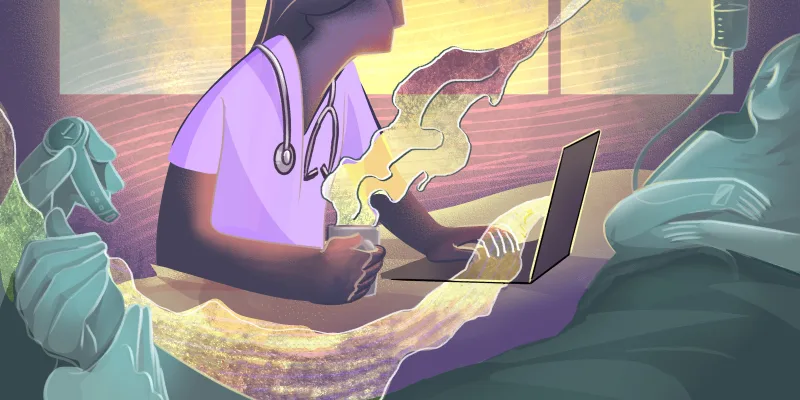
“The purpose of life is to live it, to taste experience to the utmost, to reach out eagerly and without fear for newer and richer experience.” –Eleanor Roosevelt
30,232 PGY-1 positions were offered in 2018, according to the NRMP. This number has steadily continued to increase with each passing year. As so many newly minted physicians enter the hospital this summer, I would like to take the time to reflect on the things I wish I knew before starting.
1. Take care of yourself.
It is well-known that physician burnout is a real problem, and physicians have some of the highest rates of suicide among working professionals. Intern year can be a very dark year. You are entrusted with the lives of patients, no longer a medical student watching on the sidelines. You are privileged to be able to see the true depths of humanity. However, the effects of the hospital can take a toll on you.
Self-care must be a priority early in training. If you do not practice it as an intern, it will only become more difficult the further you progress in your career. There has been a growing discussion surrounding physician burnout, but not much progress in preventing it. One reason for this may be that it is being addressed too late.
Physician burnout needs to be tackled early and head on. We need to be preventing it, not just treating it once it occurs. There needs to be a fundamental change in the structure of clinical care –more time for patient interactions, fewer administrative responsibilities, and reasonable time-off to rest, though these are separate issues I will not discuss here. However, I strongly believe there needs to be education about the practice of self-care. It is not a sign of weakness to need to process emotions and to acknowledge when your mind and body feel overworked. You have to make yourself a priority. Eat healthy, exercise, sleep, and spend time with family and friends. Stay human – it keeps you connected to patients.
2. You will work harder than you thought you could.
You are now responsible for patients. They do not get sick only during business hours. Patients will need a lot of care and attention. You will think there is a tremendous amount of mental, emotional, and physical demands. This is absolutely true. As mentioned previously, you must always care for yourself. But through this challenging year you will also learn a tremendous amount. These experiences will help shape you as you grow.
3. You will be overwhelmed, and everyone else feels the same way.
What you learn from taking care of patients in the hospital cannot be learned in textbooks. What makes the human body amazing and magnificent is that each body is unique. Each patient will have nuances. You will create a mental notebook of clinical conditions; but, at the beginning of intern year, this notebook is empty. Do not be shy; ask for help. Learn from others that have gone before you. Medicine is an art. You may be very talented, but you still need to learn the fundamentals. Medical school built a foundation, but you don’t know how to take care of patients yet.
4. Your co-interns are not your enemies.
Medical school can be fiercely competitive, but intern year is not the time to compete. You will need to work as a team. Your co-interns will be the only other people that truly understand what you are going through. You are all in this together. Do not create unnecessary divisions. The community you form at work will be one of your greatest sources of strength and support.
5. Listen to your gut.
Intern year is when you learn to differentiate sick from not-sick. You will have physical exam and laboratory data to help guide your decisions, but there is an unspoken skill set that develops as the year progresses. You will learn to anticipate a patient’s clinical trajectory. Do not ignore this. It will become one of your best assets.
6. Learn from your patients.
There will be little time to sit down and read a textbook from start to finish during your intern year. Make sure you use each clinical scenario to learn. I would look up everything about a condition, and I often discovered there was still much more I did not know. UpToDate will become your best friend. Always stay curious and humble.
7. Criticism does not equal inadequacy.
This can be very difficult to take to heart, even after intern year. Most people in medicine have type-A, perfectionist personalities. We don’t like to feel inadequate or underprepared, let alone have others see our weaknesses. If you use the feedback you get from attendings, fellows, and residents to address these cracks and imperfections, you be will be a better physician. You need to know what your weaknesses are so you can work on them. It does you no good if everyone tells you how great you are.
8. Don’t compare yourself.
Ultimately, intern year will be your own unique experience. Intern year is not about how you are doing compared to someone else. This is your career in the profession you have chosen. You have worked hard to get to this point, and it does not end here. You want to provide the best care you can for your patients and that comes from sharpening your skills. You are at a point of self-actualization.
9. Stay organized.
There will be a lot of things competing for your attention and pulling you in many directions. It will be important for you to maintain a list of things that need to be accomplished. Finish one task at a time, and prioritize the most important ones. This will also help you be the most efficient. Time is a commodity. If you stay organized and on-task, you are more likely to accomplish your checklist by the end of the day.
10. Don’t forget your goals.
Remember why you are doing this. What are your goals? Where do you see yourself in five or ten years? This too shall pass. This year will not last forever. Take each day one at a time. As Albert Einstein said, “Life is like riding a bicycle. To keep your balance, you must keep moving,”
A lot of these life lessons apply no matter what stage of your career you’re in. We all need a reminder that, as rewarding as this career can be, it can take a very real toll on our minds, bodies, and spirits. Always keep in mind why you chose to do this, and never lose sight of that.
Fola Babatunde, MD is a cardiology fellow at the Washington University School of Medicine in St. Louis. She graduated from Harvard Medical School and completed her residency at Duke University Medical Center. Babatunde is a 2018–19 Doximity Author.






